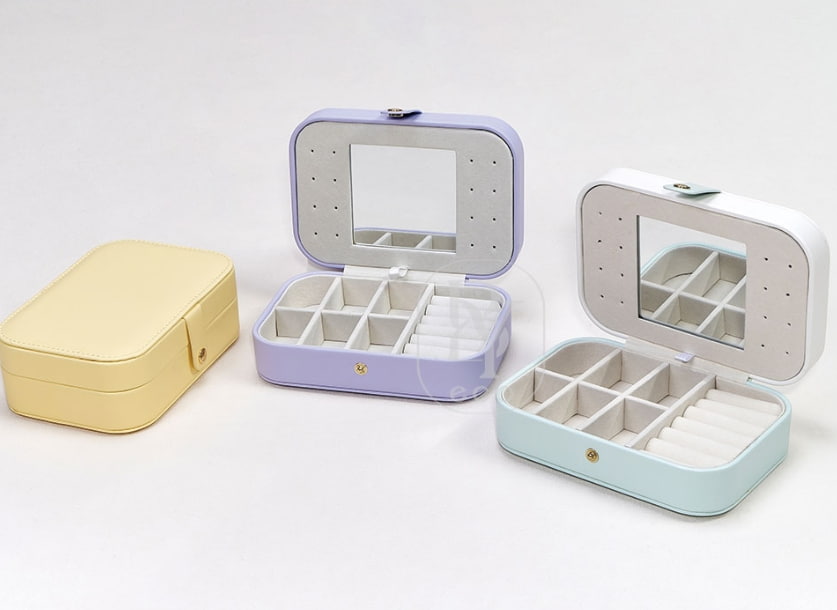You can share
- Share to Facebook
- Share to Google+
- Subscribe to our
- Share to Linkedin
- Share to Twitter

With the increasing market demand for personalized expression, brand recognition, and sustainable consumption, customized jewelry boxes have gradually become a key link for jewelry merchants to create differentiated advantages. Why do so many brands devote themselves to customized packaging? What core elements should be paid attention to during the customization process? How to systematically complete a successful customization? This article will discuss these topics.
Through customized design, jewelry boxes can deeply integrate the brand's visual elements, such as iconic colors, brand logos, and exclusive patterns, making them a mobile business card for the brand image. When consumers come into contact with the packaging, they can perceive the brand culture and texture behind it, thereby consolidating brand memory and trust.
Different from the homogeneity phenomenon brought about by standardized packaging, customized jewelry boxes give products a unique visual language and tactile experience. Whether it is using precious wood to present an elegant temperament or using recycled materials to convey a simple style, they can use the clever combination of materials and craftsmanship to create an impressive brand personality.
Jewelry consumption is not only about material acquisition, but also about emotional satisfaction. A customized jewelry box with exquisite design and clever opening method can enhance the customer's sense of ritual during the process of receiving and opening the goods, transform it into an emotional bond between the brand and the user, and increase the chances of repeat purchases and word-of-mouth communication.
Jewelry is made of various materials and has delicate shapes, which are easily damaged by external forces or eroded by the environment. Customized packaging can be designed with exclusive inner supports and buffer structures for different jewelry types - such as necklaces, rings, or earrings - to effectively avoid scratches, vibrations, or oxidation, ensuring that the products are as good as new for a long time.
Sustainable packaging has become an important manifestation of brand social responsibility. Choosing environmentally friendly materials (such as FSC-certified paper, biodegradable plastics, etc.) to make jewelry boxes can not only reduce environmental load, but also meet the recognition of more and more consumers for green lifestyles and enhance brand favorability.

There are significant differences in the expectations of different customer groups for packaging. Designs for the younger generation may be fresh and more fashionable, while high-end customers may pay more attention to luxurious details. Sufficient market research and user portrait analysis in the early stage are the basis for ensuring that the design direction does not deviate from the target market.
Jewelry boxes have a wide range of optional materials, from cardboard, solid wood, to leather, metal, etc., which correspond to different cost ranges and visual effects. At the same time, processes such as hot stamping, laser engraving, and embossing also directly affect the quality of the finished product. It is necessary to choose the most cost-effective combination solution based on brand positioning and budget.
Packaging design cannot be limited to appearance. The internal space should be reasonably planned to facilitate the classification and placement of different jewelry; the closure method should be simple and safe; if it is for portable use, the size and structure should also be lightweight to achieve the unity of beauty and function.
Customized packaging usually has a minimum order quantity requirement, and the unit price increases with the complexity of the material and the precision of the craftsmanship. Companies should set a budget range in advance, negotiate a tiered quotation with suppliers, and determine the order size based on sales expectations to control inventory risks.
First, communicate in depth with the design team or packaging supplier to clarify the core brand information, design style, and functional requirements. You can use mood boards, sketches, or reference cases to assist in expression and preliminarily determine the main visual, layout, and structural planning.
It is crucial to choose a partner with rich experience in the field of jewelry packaging. High-quality suppliers can not only accurately realize the design intentions, but also provide professional advice on material properties, production cycle, etc., to help avoid common problems.
Prototyping is an indispensable step before mass production. Through physical samples, we can fully evaluate the dimensional accuracy, color reproduction, feel, and structural strength, and propose modifications when necessary until the sample fully meets expectations.
After confirming the sample, enter the mass production stage. During this period, regular sampling inspections are required to ensure that the color, craftsmanship, and details are consistent between batches to avoid quality fluctuations during mass production.
After completion, suppliers must provide reliable logistics support to prevent damage during transportation. Some suppliers can also provide packaging, warehousing, or batch delivery services to facilitate merchants in flexibly responding to sales rhythms.
Customized jewelry boxes are an important touchpoint for brands to reach users. They not only carry the product protection function, but also serve as a silent medium for conveying value propositions. From improving the unboxing experience to highlighting environmental responsibility, its significance goes far beyond "packaging". Successful customization is inseparable from a keen grasp of brand tone, user needs, and market trends, as well as meticulous control of each link from design to delivery. A heart-warming jewelry box is often a clever footnote to a brand's long-term favor with users.